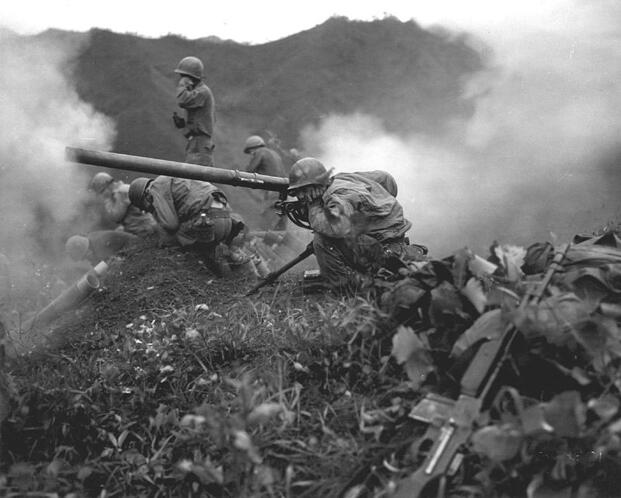Politics
Greek and American Forces Defend Outpost Harry Against 13,000 Chinese Troops

On June 10, 1953, American and Greek troops began a fierce defense of Outpost Harry, a strategic hilltop position in the Korean War, against an overwhelming force of approximately 13,000 Chinese soldiers. Led by Capt. Martin Markley, around 150 soldiers from K Company of the 15th Infantry Regiment braced for an onslaught that would last eight grueling days. As artillery fire erupted, the American defenders faced relentless assaults, showcasing extraordinary bravery in the face of overwhelming odds.
Initial Assault and Heroic Defenses
The outpost, sitting at a height of 1,280 feet in Korea’s Iron Triangle, played a crucial role in the conflict. It was strategically placed just 425 yards ahead of the Main Line of Resistance, allowing American forces to monitor Chinese troop movements while remaining dangerously exposed. Chinese forces had occupied nearby Star Hill, positioning themselves for an inevitable attack.
As night fell on June 10, the Chinese artillery barrage began, raining over 20,000 shells onto Outpost Harry. Markley’s troops, anticipating an assault, had fortified their positions but faced overwhelming numbers as Chinese soldiers surged up the slopes. “All total, there was a reinforced PVA regiment of approximately 3,600 enemy trying to kill us,” Markley later recounted.
During the first night, the intensity of the combat was brutal. American defenders engaged in fierce close-quarters combat, while artillery fire from their own ranks caused significant casualties among the attackers. Cpl. Donald L. Menken was reported missing in action after being struck by artillery fire, while Sgt. Ola Mize exhibited remarkable valor by charging an enemy machine-gun nest to save fellow soldiers, ultimately receiving the Medal of Honor for his actions.
Continued Resistance and Reinforcements
The battle for Outpost Harry did not relent, with Chinese forces returning night after night. U.S. commanders rotated fresh troops in and out of the outpost, struggling to maintain their defenses while sustaining heavy casualties. The aggressive tactics employed by American forces included the use of tanks and artillery to draw enemy fire into predetermined kill zones, resulting in devastating losses for the Chinese.
One notable act of bravery came from Pfc. Charles Johnson, who, despite suffering injuries from artillery and grenade blasts, managed to save several wounded comrades by organizing them into a secure bunker. Johnson ultimately lost his life defending his position, and his actions earned him a posthumous Silver Star.
As the fighting continued, American commanders sought assistance from the Greek Expeditionary Force, who had a storied history of combat alongside U.S. troops. The Greek battalion, known as the Spartans, arrived at Outpost Harry on June 16, ready to bolster the defenses after weeks of intense fighting.
On June 17, the Chinese launched one final, desperate assault, sending nearly 3,000 soldiers to take the outpost. The Greek forces, alongside American troops, held firm against the advancing enemy. Engaging in brutal hand-to-hand combat, they successfully repelled the attack, inflicting heavy casualties on the Chinese forces, which were reported to have suffered around 4,200 killed and wounded over the course of the battle.
The Aftermath and Legacy of Outpost Harry
The defense of Outpost Harry came at a high cost. Over the eight-day battle, Chinese forces fired more than 88,000 artillery and mortar rounds at the outpost, while American and Greek artillery responded with a staggering 368,000 rounds. Ultimately, the Chinese 74th Division was rendered combat ineffective, and the Allied forces sustained significant losses, including 102 Americans killed, 553 wounded, and 44 missing. The Greek battalion itself suffered 15 killed and 36 wounded.
In recognition of their extraordinary bravery, five U.N. companies, including four American and one Greek, received Presidential Unit Citations, marking a historic moment in military recognition for joint operations.
The fierce combat at Outpost Harry coincided with the final stages of armistice negotiations at Panmunjom, with both sides vying for strategic advantages. The successful defense ultimately helped to ensure that the front lines remained favorable for United Nations forces when the fighting ceased on July 27, 1953.
Decades later, the legacy of those who fought at Outpost Harry remains significant. Sgt. Ola Mize went on to serve with distinction in Vietnam, while Johnson’s Silver Star was upgraded to the Medal of Honor, presented to his sister by President Joe Biden in January 2025. The remains of Cpl. Donald L. Menken were finally identified and repatriated in 2022, nearly 69 years after his sacrifice.
Today, Outpost Harry lies within the Demilitarized Zone, a testament to the fierce determination of the soldiers who defended it. The hill, though small and seemingly insignificant, witnessed some of the heaviest fighting of the Korean War, marking a critical chapter in the history of military valor and sacrifice.
-

 Science4 weeks ago
Science4 weeks agoInterstellar Object 3I/ATLAS Emits Unique Metal Alloy, Says Scientist
-

 Science1 month ago
Science1 month agoResearchers Achieve Fastest Genome Sequencing in Under Four Hours
-

 Politics1 month ago
Politics1 month agoAfghan Refugee Detained by ICE After Asylum Hearing in New York
-

 Business1 month ago
Business1 month agoIconic Sand Dollar Social Club Listed for $3 Million in Folly Beach
-

 Health1 month ago
Health1 month agoPeptilogics Secures $78 Million to Combat Prosthetic Joint Infections
-

 Business1 month ago
Business1 month agoMcEwen Inc. Secures Tartan Lake Gold Mine Through Acquisition
-

 Lifestyle1 month ago
Lifestyle1 month agoJump for Good: San Clemente Pier Fundraiser Allows Legal Leaps
-

 Science1 month ago
Science1 month agoMars Observed: Detailed Imaging Reveals Dust Avalanche Dynamics
-

 Health1 month ago
Health1 month agoResearcher Uncovers Zika Virus Pathway to Placenta Using Nanotubes
-

 World1 month ago
World1 month agoUS Passport Ranks Drop Out of Top 10 for First Time Ever
-

 Entertainment1 month ago
Entertainment1 month agoJennifer Lopez Addresses A-Rod Split in Candid Interview
-

 Business1 month ago
Business1 month agoSan Jose High-Rise Faces Foreclosure Over $182.5 Million Loan









